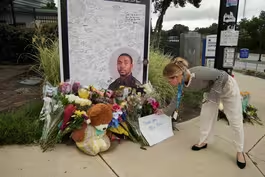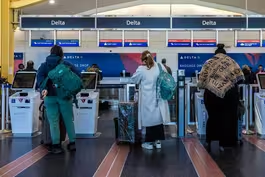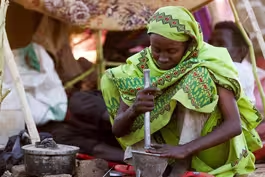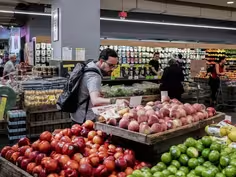
Maine residency gives Black and Brown artists a platform
Clip: 8/12/2025 | 7m 52sVideo has Closed Captions
Maine arts residency gives Black and Brown artists a platform to develop their craft
Indigo Arts Alliance is an organization focused on supporting contemporary Black and Brown artists and opening doors to artists of color worldwide. It's doing all of this from its home in an unlikely place: Maine. Jeffrey Brown reports for our arts and culture series, CANVAS.
Problems playing video? | Closed Captioning Feedback
Problems playing video? | Closed Captioning Feedback
Major corporate funding for the PBS News Hour is provided by BDO, BNSF, Consumer Cellular, American Cruise Lines, and Raymond James. Funding for the PBS NewsHour Weekend is provided by...

Maine residency gives Black and Brown artists a platform
Clip: 8/12/2025 | 7m 52sVideo has Closed Captions
Indigo Arts Alliance is an organization focused on supporting contemporary Black and Brown artists and opening doors to artists of color worldwide. It's doing all of this from its home in an unlikely place: Maine. Jeffrey Brown reports for our arts and culture series, CANVAS.
Problems playing video? | Closed Captioning Feedback
How to Watch PBS News Hour
PBS News Hour is available to stream on pbs.org and the free PBS App, available on iPhone, Apple TV, Android TV, Android smartphones, Amazon Fire TV, Amazon Fire Tablet, Roku, Samsung Smart TV, and Vizio.
Providing Support for PBS.org
Learn Moreabout PBS online sponsorshipAMNA NAWAZ: It's an arts organization focused on supporting contemporary Black and brown artists and opening doors to artists of color worldwide.
As senior arts correspondent Jeffrey Brown reports, Indigo Arts Alliance is doing all of this from its home in an unlikely place.
Maine.
It's part of our arts and culture series, Canvas.
JEFFREY BROWN: And we are walking on your poem.
ARISA WHITE, Poet: Yes, they are.
JEFFREY BROWN: But you want us to.
ARISA WHITE: Yes, that's the point.
JEFFREY BROWN: A walk in the Coastal Maine Botanical Gardens with poet Arisa White, who was commissioned to create a work within this natural setting.
Her response, a mirror poem or palindrome that can be read forwards or backwards step by step.
ARISA WHITE: So you actually get to determine the pace of your reading and the pace of your contemplation.
JEFFREY BROWN: Now an associate professor of English at Maine's Colby College, White credits the Indigo Arts Alliance, where she was an artist in residence, with helping her adjust to her new surroundings.
ARISA WHITE: I moved here in 2018 from the San Francisco Bay Area, but originally from Brooklyn, New York, and sort of left these huge communities, these major cities.
JEFFREY BROWN: And very diverse places.
ARISA WHITE: Absolutely diverse in all sorts of amazing ways.
And so there was that sense of isolation.
And Indigo Arts Alliance felt like a hub.
It is a home for me.
It gave me a way to connect to different artists throughout the state.
And so I felt like I had a place as a result.
JEFFREY BROWN: In fact, this day at the botanical gardens in Boothbay, Maine, was part of a three-year partnership with Indigo.
WOMAN: Welcome, everyone.
JEFFREY BROWN: Called Deconstructing the Boundaries, it involved artist talks, workshops in clay and beading, and discussions of public life today.
It's also brought new artworks to the gardens, including this sculpture called In the Voice of Trees by Indigo's co-founder Daniel Minter.
DANIEL MINTER, Co-Founder, Indigo Arts Alliance: It's the ideas, people who want to make connections.
We're reaching out to build community with people who wish to make connections.
JEFFREY BROWN: It was Daniel's wife and Indigo co-founder, Marcia Minter, whose work first brought the couple to Maine in 2003, when she was recruited by L.L.
Bean as a marketing executive.
It seemed a good career move, but the Minters had concerns about coming to a state then and still one of the least diverse in the nation.
MARCIA MINTER, Co-Founder, Indigo Arts Alliance: And at a point where the conversation got serious, I said to the recruiter: "I can't move someplace where my son is not going to see someone that looks like him."
JEFFREY BROWN: But they also saw an opportunity towards something larger through art.
Marcia Minter spent 16 years at L.L.
Bean before she and Daniel founded Indigo in 2018 in Portland, where the group now owns an 8,000-square-foot artist-in-residence studio and community space.
MARCIA MINTER: I realized that there could be a place for us, and we decided to give it a shot.
That doesn't mean the path has been easy.
That doesn't mean that we have been welcomed with open arms at every turn.
It has not been easy.
We have really had to build community here.
We have had to seek and find community of all kinds, not just other Black people or other brown people or indigenous folk, but people, period.
And because that was the only way that we could stay here, we made it our mission.
JEFFREY BROWN: Building connections through art and history has been a major part of Daniel Minter's own practice, also based in Portland, where he works in many forms, including sculpture, painting, collage.
He's also illustrated more than a dozen books for young readers, winning numerous honors.
And a large-scale immersive installation he created is featured in a major exhibition on the transatlantic slave trade, In Slavery's Wake, organized by the National Museum of African American History and Culture, now traveling to museums around the globe.
DANIEL MINTER: This is one of the first images I did to help tell that story.
JEFFREY BROWN: He's also told a little-known piece of Maine's history of racism through a multiyear project exploring a small mixed-race community on Malaga Island just off the Maine coast, active from the Civil War until 1912, when the state forcibly removed its residents.
DANIEL MINTER: I sought, uncover this history, yes, and also connect this history.
So we know the story.
We know this.
We just don't know that it was happening in Maine.
We just don't know that it was happening this far north.
JEFFREY BROWN: But why?
I mean, why as an artist?
And why take on that story through art?
DANIEL MINTER: Because it is the responsibility of an artist to make the unseen seen.
JEFFREY BROWN: To that end, Indigo also supports scholarly research and archival projects to study and preserve the work of artists of the past, and most prominently offers time, space and future connections through its residency programs for Maine artists such as Candice Gosta, as well as artists from further afield, such as Aisha Tandiwe Bell, who works with a variety of materials, including clay.
AISHA TANDIWE BELL, Artist: For this particular project, I was looking at how mythology and parables are created and where their foundations are.
JEFFREY BROWN: Bell, who lives and works in Brooklyn, has had other artist residencies.
Indigo, she says, offers a special kind of comfort and energy.
AISHA TANDIWE BELL: Especially in the art world, it's a very small brown and Black community, right?
So, often, when you're in those spaces, you are one of or the only.
I think you're often, if not always thinking about how you present yourself, your work in a different -- it's just a different level of self-consciousness and awareness in those spaces.
ALEJANDRA CUADRA, Artist: I will eventually finish this in one of the hands that's going to hold this basket.
JEFFREY BROWN: Another artist this summer, Alejandra Cuadra.
But with a real message here.
ALEJANDRA CUADRA: Yes, with a message.
JEFFREY BROWN: Don't break.
ALEJANDRA CUADRA: Don't break.
JEFFREY BROWN: Born in Peru, raised in Massachusetts, where she still lives, Cuadra says art has always been her way of responding to the world around her, especially with all that's impacting her community now.
ALEJANDRA CUADRA: It's hard times.
It's challenging times.
And I think, as an immigrant, I feel it.
And, again, I think it goes back to feeling like I have a voice when I'm voiceless.
JEFFREY BROWN: Like arts organizations around the country, Indigo Arts Alliance has recently lost grants from the National Endowment for the Arts.
Daniel and Marcia Minter say it now depends on robust individual and private foundation donor support.
Does your work change at a moment like this?
MARCIA MINTER: Oh, no.
(LAUGHTER) DANIEL MINTER: No, no, no, no, it doesn't change.
MARCIA MINTER: It becomes more important.
DANIEL MINTER: Yes, it becomes... MARCIA MINTER: It just is a testament to how important that work is and also how the people that are so frightened by the global majority are so in need of places and spaces like ours, because we are their opportunity to learn a lot about who they are.
JEFFREY BROWN: For the "PBS News Hour," I'm Jeffrey Brown in Boothbay, Maine.
CDC shooting highlights hostility against health workers
Video has Closed Captions
Clip: 8/12/2025 | 8m 2s | CDC shooting highlights increasing rhetoric and hostility against health professionals (8m 2s)
How to beat AI-driven custom pricing
Video has Closed Captions
Clip: 8/12/2025 | 4m 39s | How to beat AI-driven custom pricing (4m 39s)
State Department drops criticism of Israel and El Salvador
Video has Closed Captions
Clip: 8/12/2025 | 6m 22s | State Department drops criticism of Israel and El Salvador in human rights report (6m 22s)
Sudan's famine worsens as civil war intensifies
Video has Closed Captions
Clip: 8/12/2025 | 5m 33s | Sudan's famine worsens as civil war intensifies: 'We have nothing to eat but animal feed' (5m 33s)
Tariff-driven inflation accelerating, AEI's Strain says
Video has Closed Captions
Clip: 8/12/2025 | 6m 7s | Tariff-driven inflation accelerating with 'worst yet to come,' AEI's Michael Strain says (6m 7s)
Providing Support for PBS.org
Learn Moreabout PBS online sponsorshipSupport for PBS provided by:
Major corporate funding for the PBS News Hour is provided by BDO, BNSF, Consumer Cellular, American Cruise Lines, and Raymond James. Funding for the PBS NewsHour Weekend is provided by...

















